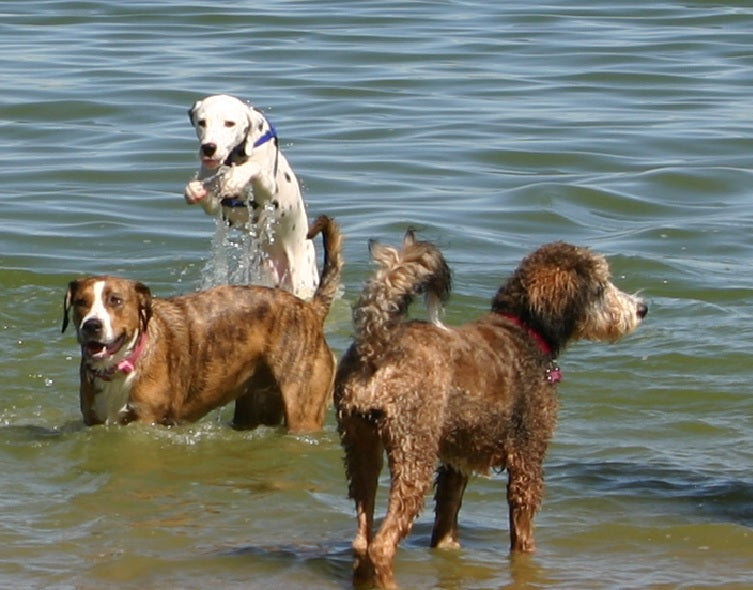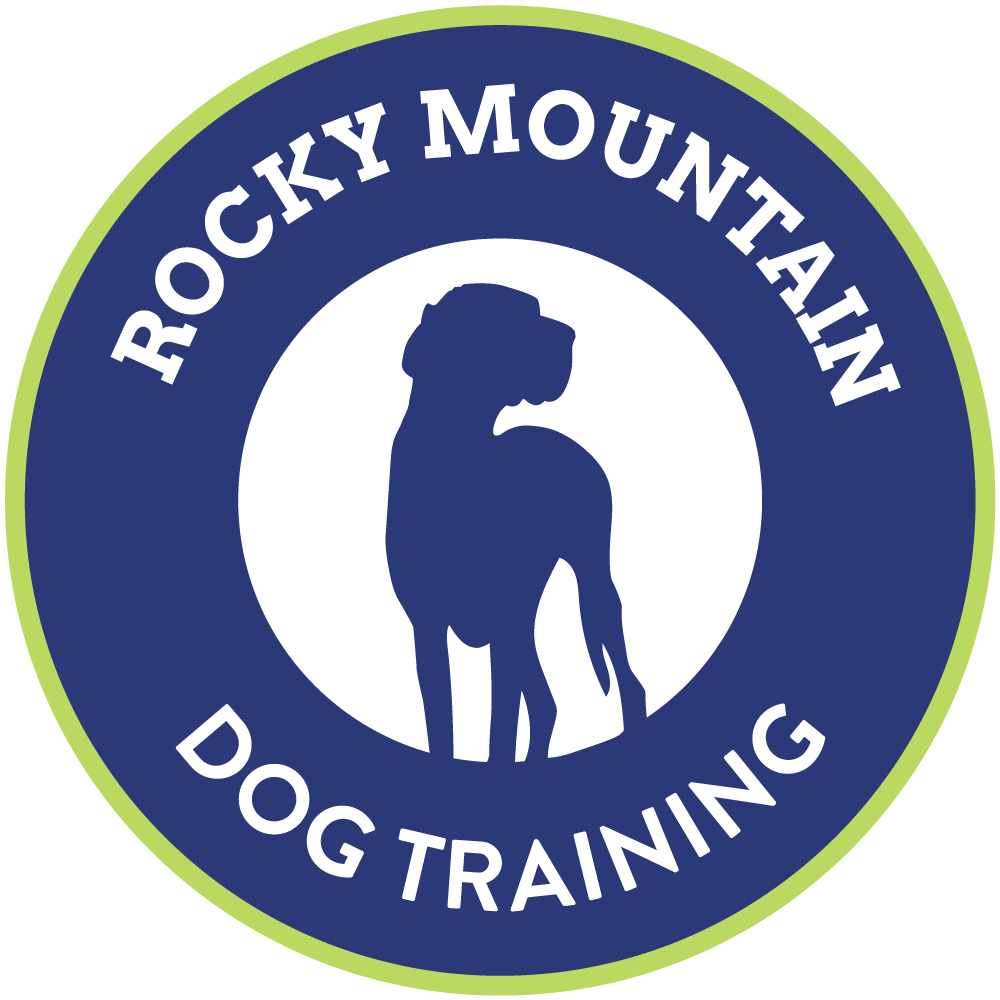In our classes, I often get asked about dog parks. In the past, I've admittedly been on the fence about them, and at the root of it was my own lack of understanding that led to this stance. I was wrong. Nowadays, I am a huge supporter for the right dogs and let me explain why:
Dogs are starved for the ability to interact with their own species. Often, the inability to play and practice species-normal behaviors can add to a dog's frustration when encountering other dogs. I also love them because they help busy people meet their dog's needs. We put in so many hours at work, it becomes challenging for us to do enough with our dogs and also get the down time we so desire and this creates a circular issue of a dog who needs and wants more, and who creates ways to meet their needs that we don't really love. This causes frustration in the relationship between us and them, frustration causes a lack of motivation to do anything, and guilt kicks in. The issue gets worse and worse.
Often, people will remark that dogs who go to the dog park get dog-crazed. Let's dissect that. Why do things become valuable? It's typically because they're rare. Why do we crave things? Because we haven't had access to them in a long while. With a dog who is social with other dogs, to deny their ability to engage with them makes them all the more valuable to the dog. When something is easy to access all the time, it loses its novelty. This is basic science.
Let's talk science for a minute:
Motivational Operations (MO) from a behavior perspective are tools that we can use to increase or decrease the value of something the animal finds reinforcing. Establishing Operations fall under the MO umbrella. For instance, if we want to make the food we're using MORE reinforcing, we would train when the dog is hungry. If a dog finds play with other dogs really reinforcing and we want to make it more valuable, we would deny access to play to make it a stronger reinforcer to dogs.
Abolishing Operations also fall under the MO umbrella. Abolishing operations (also known as saturation) can be used to make something that is highly motivating for the dog less motivating. We use this a lot in distraction training to decrease the value of the things competing with us for our dog's attention. Often distractions are really just rewards we can't control.
Example: Let's say you looove pizza. Pizza is your #1 food of choice. That first bite is absolutely amazing, but by slice 3, pizza isn't as appealing to you. And if you sat down and ate a whole pizza and then someone brought you another, I'd guess that continuing to eat pizza is really no longer on your to-do list, at least for the time being.
This holds true for social dogs too. When I work with dogs in my level 2 distractions class, if they're really social with other dogs and struggle to focus in the class setting, right in their handouts we recommend they do some dog play 30 minutes prior to the training class (abolishing operations) and lo and behold: The dogs get saturated to play. SCIENCE! They get enough of it that when they get to training class, they're no longer hyper-focused on the other dogs in class. They can work beautifully with their owners. Our goal in class is focus on their people, and this is one way we get them there.
They've had enough play that engagement with their owners for food rewards is now the bigger draw for them. This is a purposeful step in helping dogs succeed at training in high distraction environments. It doesn't just need to be dogs, but you get the idea here.
Everything we do or don't do with dogs plays into a larger scheme of things. Denying dogs access to something they desperately want only serves to make that craving stronger. Granting lots of access to something they want serves to decrease its value. Science lesson over.
Now, back to dog parks. For pet dogs who love to socialize and play with their own species who live in busy households, this is such a fantastic option. Dogs can run and sniff and play and swim and come back to you more focused and ready to work, or chilled out so that the two of you can enjoy a relaxing evening together. And it happens fast! Most dogs don't need loads and loads of it to satiate their need.
For a very active dog, neighborhood walks just don't cut it and would take forever if you're looking to physically meet a dog's needs. But the dog park - it's quick and it's fun and it's got enrichment built in. Navigating social interactions and sniffing and digging and investigating it takes a lot of brain power. It's magical.

Best Practices:
- Dog parks aren't for all dogs. Your dog should enjoy play with other dogs.
- When you head to the park, your job is to supervise your dog because nobody else is going to. You don't let your dog be a bully and you don't let other dogs bully yours. Play bouncer for your dog. If they're trying to leave an interaction and they need an extra hand, you get in there and help them get space by body blocking the other dog. Really, if either dog is suspect of not enjoying it, intervene.
- If your dog is scared or uninterested in play, they're likely to prefer another activity (see my post about long line walks from a couple weeks ago).
- Even if your dog *was* playing great on arrival, if they start making poor choices they're probably tired. Take em home. There's always tomorrow. (Did you know when we do play at our facility, it's always around 30 minutes and there are activities mixed in to help the dogs get a break and to build other skills? Breaks are important!)
- Dogs who bully other dogs should be timed out for the behavior (they temporarily lose access to play), and if they continue, they leave for the day. This will look like a continuous targeting of one specific dog. It's inappropriate and unacceptable. Qualified trainers can help here!
- Some folks with really good intentions are misguided into thinking the dog park is a great place to teach their scared dog to not be scared. This is unfortunate but happens, and if you see it, steer clear of these dogs. They need space.
- Dogs on leash at the dog park can get frustrated by not being able to access the other dogs, and this can look and sound scary, so give them space too.
- If dogs are wearing metal or electric collars, avoid them. These can be risky for your dog to crack a tooth on or the other dog may associate any pain they feel with your dog and this is dangerous. Most dog parks post signs against using these tools in that setting. Personally I'd like them to go away forever, but that's for another day.
- If you're unsure if dogs are having a good time, ask them! Do a consent test. See links in comments.
- Size the groups appropriately. Many dog parks have large and small dog areas and this is intentional. Use them. Size matters in play, and no matter how much your little guy likes play, we don't want to risk them getting stepped on and injured in it when big dogs are running.
- Puppies should not be at dog parks. Disease risk for under-vaccinated puppies is very real. Choose a structured social group for them instead. There they will get padded with positive experiences so that later when they're older they can have a great time and have resilience to bounce back quickly if ever a negative experience occurs. If dog parks are in your pup's future, get them well-padded to play interactions in their socialization window so they're ready to roll in adulthood.
- Know that as dogs get older, sometimes their yearning for play decreases. Even if they loved play as a 1 year old, at 2 on if they're not as into it, it's okay. In fact, it's normal. Again, try a long line walk instead.
- A strong recall / coming when called behavior is a really good idea to have on board before hitting the park.
The deal with all environments for all species is that there are always risks, but we need to heavily evaluate the fairly low risk for high reward. I am sick to death of hearing about how insanely risky dog play is. The risk is minimal when you're responsible. You can always leave if needed. Dogs are by and large peaceful animals, and when they do actually squabble, yeah it's loud, but it's considered clean fighting in their world.
Anything beyond superficial scrapes are rare. Our fear of dogs because they communicate differently needs to be checked. Denying dogs the ability to be dogs is wrong. It's so narcissistic to think that we should be their only focus. It's not honoring the dog for the amazing animals they are. Yes, sometimes things can go wrong, but by and large they go right.
A Word About Rare Event Reporting + Our Susceptibility To It:
We often get hyper sensitive to risk because we are bombarded with horror stories all the time. They draw us in and hold our focus. It's more interesting for some reason. But of the hundreds of thousands of dogs that go to the dog park, most do so without incident. It's sad that "I took Luna to the dog park and she had a great time" isn't the more popular headline. Why are we so focused on the negative?
Please know that while dog parks aren't for all dogs, they are a great option for many, and can increase quality of life exponentially. If you know loads of dogs your dogs can play with in their own groups at home, you're so lucky, but that's not the reality for most pet dog people.
Let them Play!

